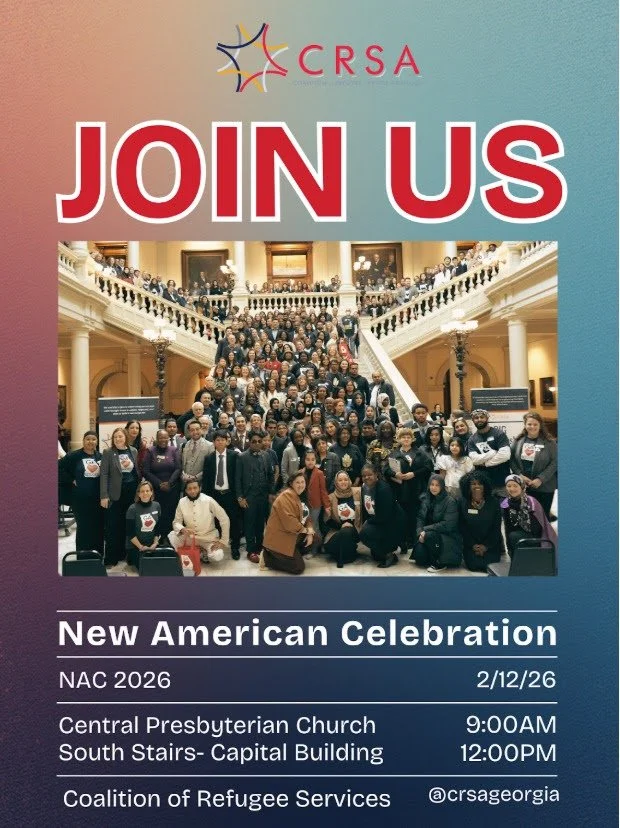Introducing the Unaccompanied Children's Defense Project
/By Ashley LaRiccia, Equal Justice Works Fellow at Lutheran Services of Georgia Disclaimer: The views and opinions expressed in this article are those of the author and do not necessarily reflect the official policy or position of Lutheran Services of Georgia.
The court room is packed today. The rows are filled with children, some in their Sunday best and others in jeans. Some of the teenagers appear to be there alone, while the younger ones sit next to adults. Only about a third of the children appear to have an attorney with them. An eight-year-old girl walks up to the front of the court room. She fumbles with the gate and manages to pull it open, taking her seat at a table designed for a person much taller than her. The judge requests, through the court interpreter, for the young girl to speak her name into the microphone. The judge asks the child if her mother is in the court room today and she shakes her head no. After a brief back-and-forth, it is discovered the child’s neighbor brought her to court. It is likely that her mother, being undocumented herself, was too scared to set foot in the courtroom.
At the table to the child’s right sits the government’s experienced attorney, with a cart full of files containing the names of children on the docket for that day. The government has charged the children in the courtroom with entering or remaining the United States illegally and is seeking to have them deported to their home countries. The girl is asked if she understands the charges being made against her and she musters a weak yes. The judge requests that at the next court date the little girl's mother come along so that the importance of finding an attorney can be explained as well as the consequences of a removal order. The girl nods and says she understands, but it is unclear if she fully comprehends the gravity of her impending deportation. The judge then calls up the neighbor and explains this all over again, hoping an adult will be able to better explain the interaction to the child’s mother. Finally, the little girl is given a date for one month into the future, to return to the court. The little girl slides out of the chair, struggles again with the gate and skips to the back of the courtroom holding her neighbor’s hand.
This scene of gross inequality in front of the law, of a young child expected to represent herself against the government, armed with an experienced and well-trained attorney, plays out in immigration courts across the country every day. The Immigration Judge is not allowed to advocate for the child, as she is there to enforce the law, not to change it. In criminal courts, all defendants are provided with an attorney, regardless of their immigration status, but because immigration court is considered a civil court, such protections are not granted. Though an immigration offense is not a criminal one, the consequences of being found guilty can be a death sentence for children who have risked their lives to escape the violence of their home countries.
In America, a land that prides itself on promoting justice and protecting the rights of the most vulnerable, the courts are failing to protect the rights of our world’s most precious resource: our youth. There are many visas available to children who have come to the United States without their parents, escaping unimaginable violence from gangs, drug trafficking, domestic abuse, and forced labor. Although these visas provide routes to obtaining legal status, securing a visa is nearly impossible without an attorney. It is estimated that if represented a child will be able to remain in the US about 50% of the time, but without an attorney that figure drops to one in ten. In light of the recent increased migration from Central America, with nearly 70,000 unaccompanied children apprehended after crossing the border this year it has become even harder for these children to locate an attorney. The cost of a private attorney is prohibitive for many children and their families or friends who have stepped forward to care for them. Non-profits are operating at full capacity and, despite a nation-wide effort to increase the number of attorneys taking these cases pro-bono, thousands of children remain unrepresented and facing near certain deportation orders.
Lutheran Services of Georgia recognized the need for legal representation for these children even before the mass immigration seen at our southern border over the spring and summer. Back in the summer of 2013, Lutheran Services of Georgia reached out to my alma mater, the University Of Maryland School Of Law, through an alumni connection and asked for a recent graduate to apply for an Equal Justice Works Fellowship. This fellowship program provides recent law school graduates who are passionate about public interest law with funding to develop a project that will address an inequality in our justice system. After hearing about this opportunity, I decided to jump onboard. Together with LSG staff, I applied for funding and was awarded a fellowship through Equal Justice Works sponsored by McGuireWoods and Dupont. I started work on my fellowship project, entitled the Unaccompanied Children’s Defense Projectback in September 2014. Over the past few months I have been busy laying the groundwork and making the connections necessary to expand representation to unaccompanied minors in the Atlanta immigration court. I am looking forward to taking on my first clients and working to address the justice gap that exists when children are expected to represent themselves in immigration proceedings. I welcome any questions about my project, and also encourage any attorneys who may be interested in volunteering to contact me at alariccia@lsga.org.













